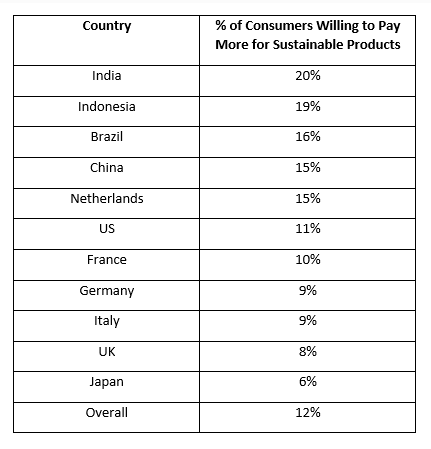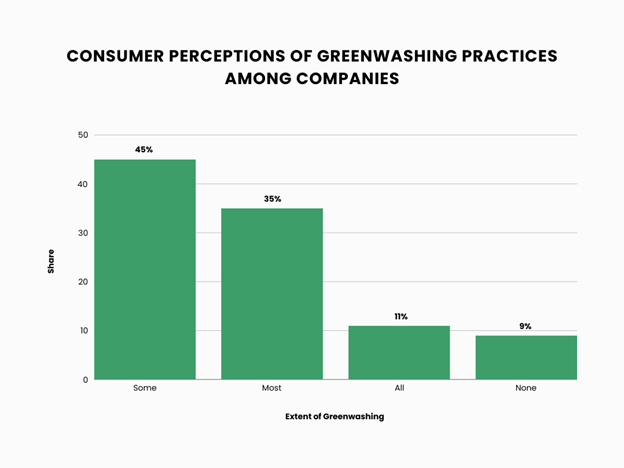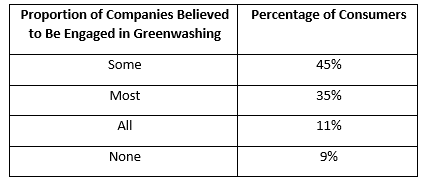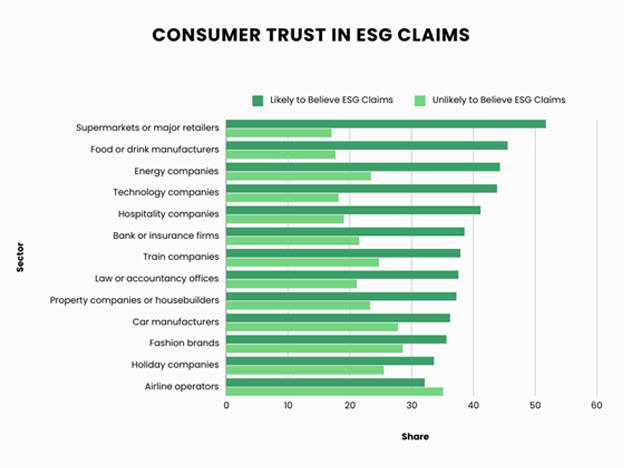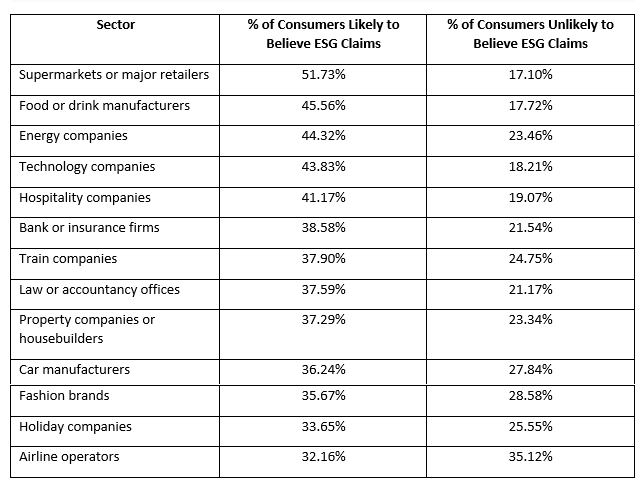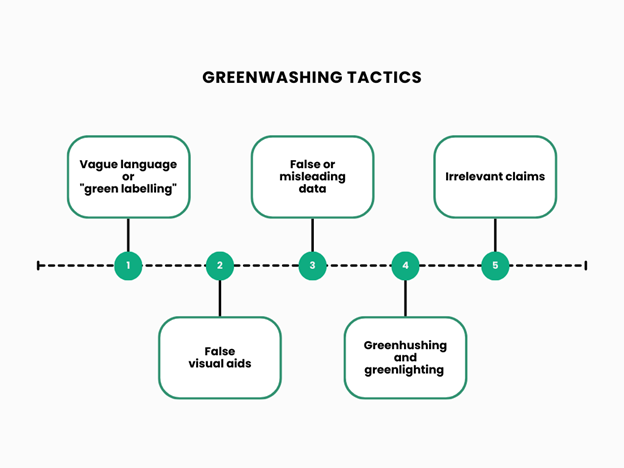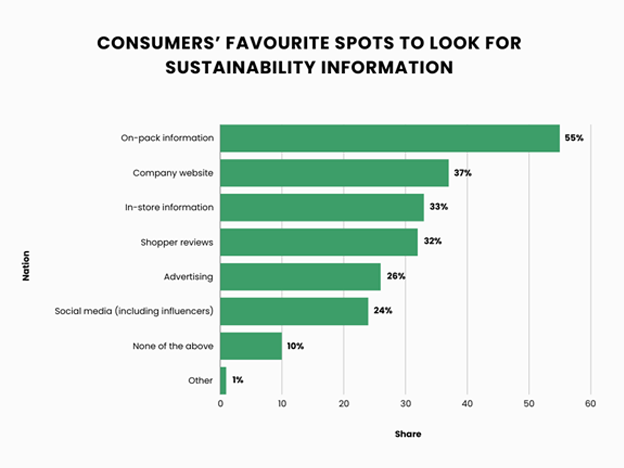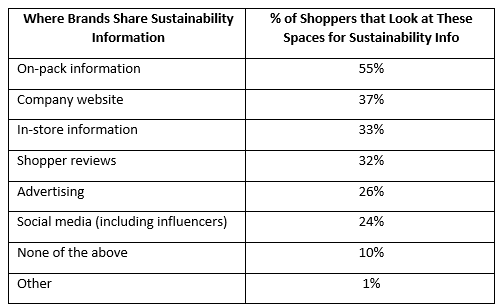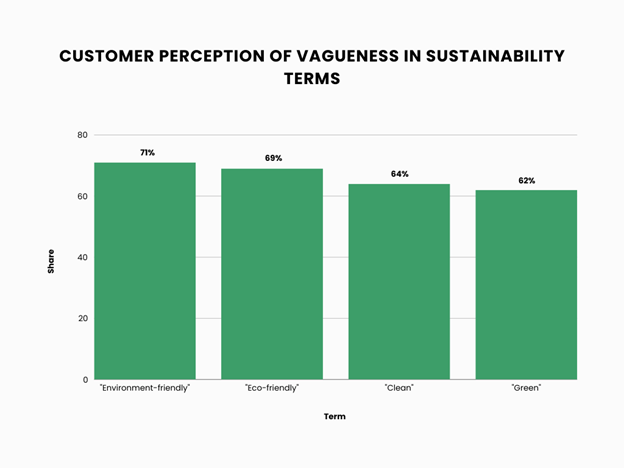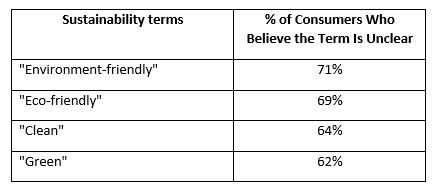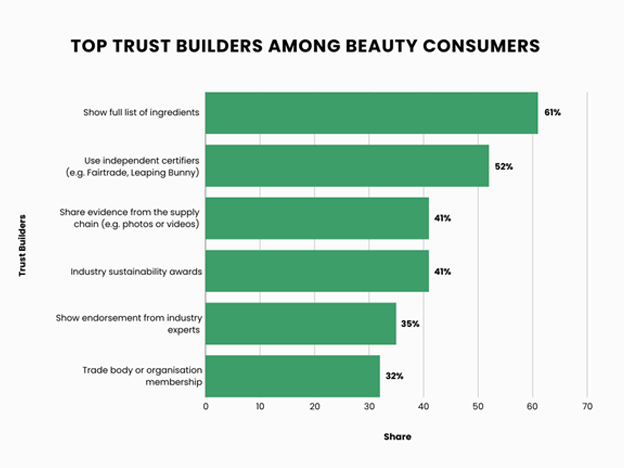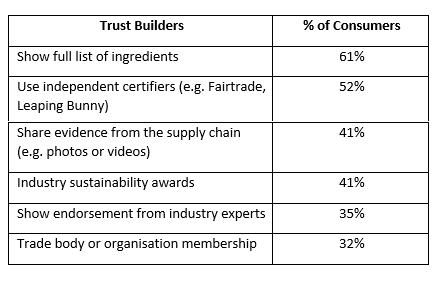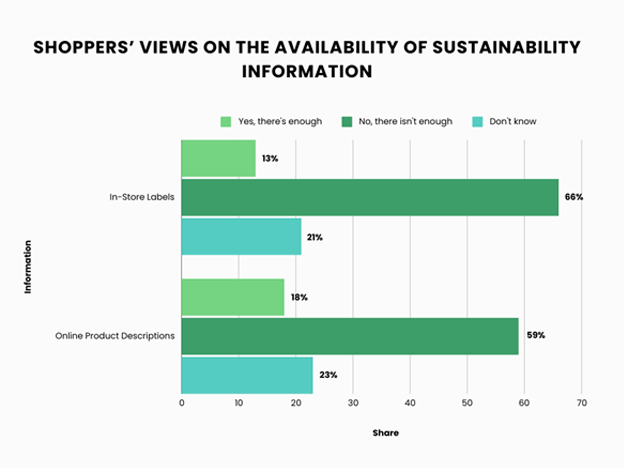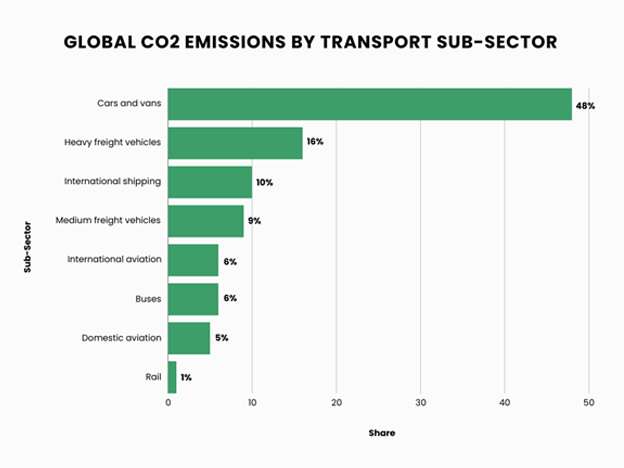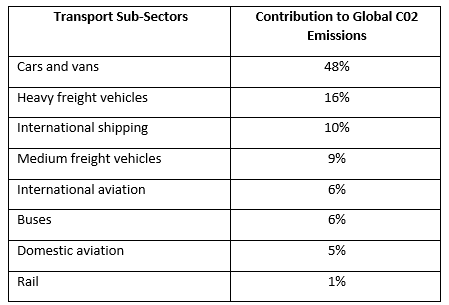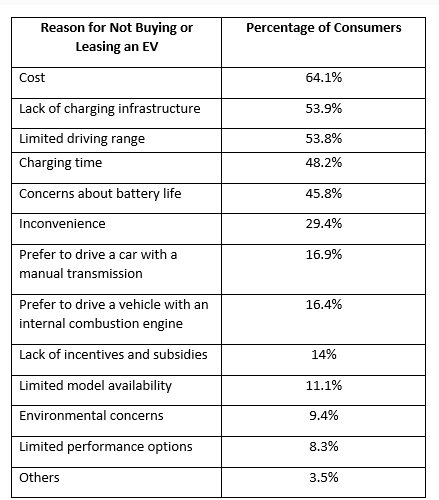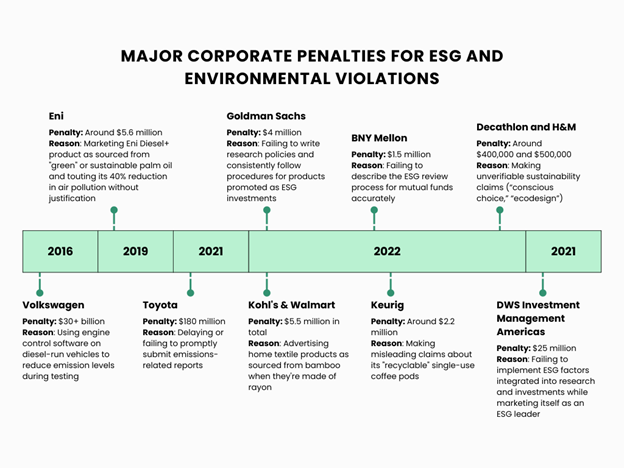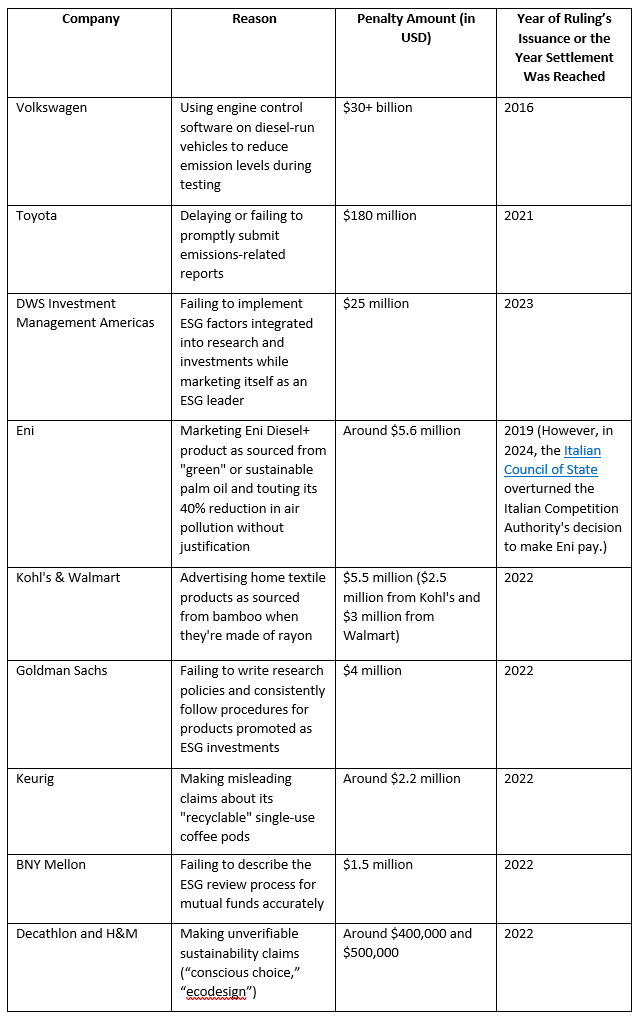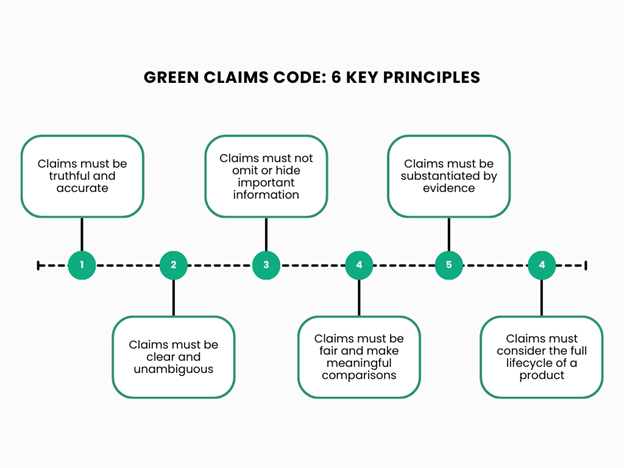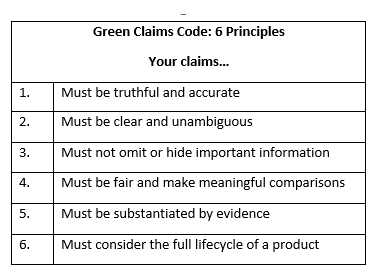Greenwashing: The Ultimate Guide for Businesses & Consumers
Greenwashing is using misleading or exaggerated claims about the environmental protection or sustainability commitments of one’s business. The practice involves deceitful advertising to project a positive image and get more customers and sales.
American ecologist Jay Westerveld first used the term in 1986 while sharing his experience in Fiji, where he encountered a note at a resort asking clients to reuse towels. He slammed the policy hypocritical as bungalow construction in the area had destroyed the island’s coral reef and marine ecosystem.
Why Do Businesses ‘Greenwash’?
The growing public awareness of environmental exploitation in the name of profit has prompted businesses to project themselves as Earth conservationists. Companies have pivoted towards being “carbon neutral,” “zero waste,” and “cruelty-free” because these slogans sell.
A 2023 Bain & Company survey showed that 50% of consumers consider sustainability as a top factor for shopping choices. Moreover, shoppers are willing to pay more for eco-friendly products in varying degrees based on their location.
https://www.bain.com/insights/selling-sustainability-means-decoding-consumers-ceo-sustainability-guide-2023/
As a result, brands employ tactics to ensure that their offers capture the environmentally conscious shoppers’ attention, giving them an edge over competitors. Meanwhile, many businesses don’t want to invest in complex sustainability programmes. Instead, they opt to face the risk of paying regulatory fines because an environmental impact analysis of company operations costs just as much—or more. Moreover, findings may point to the need for organisation-wide changes that owners and workers aren’t prepared to face.
Greenwashing Practices
Research firm RepRisk revealed in a 2023 report that greenwashing caused 25% of climate-related ESG (environmental, social, and governance) risk incidents between September 2022 and September 2023, up from 20% in its 2022 report. Greenwashing reportedly increased by 70% in the financial and banking sector. Moreover, 54% of Asian, European, and North American businesses “greenwashed” their greenhouse gas emissions and pollution data.
Meanwhile, a PicoNext survey conducted in November 2023 showed a growing awareness of greenwashing among consumers. The majority of respondents believe that “some” (45%) or “most” (35%) of businesses engaged in greenwashing.
https://piconext.com/article/digital-product-passport-global-sustainability-study/
Sectors most trusted for ESG include supermarkets, food and drink brands, and energy companies, based on a report by Sensu.
In what ways do companies practise greenwashing? Here are five general tactics:
1. Vague language or “green labelling”
Companies describe their product or service using the words below:
- Natural
- Environment or eco-friendly
- Botanical
- Sustainable
- Good for the Earth
- Organic
These terms are empty claims when labels don’t explain what makes a material sustainable or how biodegradable items should be disposed of. Entities genuinely advocating environmental conservation are transparent about their ingredients and operational standards.
2. False visual aids
Brands can appear environmentally responsible by featuring nature (grass, flowers, or trees) elements and animals or using green colours on their packaging and advertisements. Like green labelling, using such imagery is just an illusion without details about their relevance to the brand’s commitment to reducing greenhouse gases or harm to flora and fauna.
3. False or misleading data
Organisations can fabricate data or fund research to release misleading data to project sustainability. For example, some brands can make absolute claims, stating they use 100% plastic-free material even if it contains a certain percentage of plastic. Also, research results can favour specific industry players that fund these studies.
4. Greenhushing and greenlighting
Greenhushing refers to hiding or under-reporting company data on sustainability. Meanwhile, greenlighting emphasises only specific “green” aspects of a product or business operations. Exaggerating a minor improvement in fulfilling regulatory requirements as if it has surpassed the standard is also a form of greenlighting.
Businesses that claim their products or operations have a lower environmental impact than others should share their calculation method. They should also clarify the nature of any certifications obtained and the specific areas of operations that passed tests.
5. Irrelevant claims
Focusing on excluding a prohibited or harmful ingredient or practice from a product or service is a greenwashing technique when the industry has already banned that material or process.
Industries on Spotlight
Various industries can use several greenwashing techniques. Let’s take a look at how it happens in three sectors:
Cosmetics
Results from a 2022 Provenance survey showed consumers primarily read labels and packaging information (55%) for information about a product’s environmental impact. Thus, transparency among brands starts here.
https://info.provenance.org/hubfs/Skin%20Deep%20Beauty%20Report%202022.pdf
Beauty brands “greenlight” or conduct selective disclosure if they claim their primary packaging or containers are recyclable or sustainable when not all of them are.
Example: Procter & Gamble boasts that Head & Shoulders shampoo comes in recyclable bottles. However, watchdog Changing Markets Foundation pointed out on its “Greenwash” site that the brand’s sustainability webpage shows that the company only recycles white-coloured bottles. As the shampoo bottle features blue-coloured packaging, the item is outside the company’s recycling programme.
Companies also greenwash when they claim to be better than others without specifying a standard for such comparison.
Example: L’Oreal promotes its Elvive Full Restore 5 shampoo bottle as “More sustainable: Our new bottle is made of 100% recycled plastic.” However, CMF called out the company for not using any measurement to substantiate its claim.
Meanwhile, fragrance producers and beauty brands that use substances extracted from animal body parts or secretions can’t claim to be Earth-friendly.
Example: People for the Ethical Treatment of Animals urged the public to stop buying from Lilly Lashes, saying it uses fur from minks in captivity.
In the same Provenance poll mentioned above, consumers admit that terms evoking sustainability are unclear.
https://info.provenance.org/hubfs/Skin%20Deep%20Beauty%20Report%202022.pdf
However, proof-backed claims through full ingredient lists and independent verifies can earn the buyers’ trust.
https://info.provenance.org/hubfs/Skin%20Deep%20Beauty%20Report%202022.pdf
Fashion
Fast fashion has become notorious for its waste, pollution, and unfair labour contributions worldwide. As a result, the clamour is rising for consumers to be vigilant in checking the composition of products, origin, and ethical standards of brands. However, companies find their way around such scrutiny through marketing terms.
Example: “Mango Committed” is an example of such a ploy. Following the popularity of H&M’s “Conscious Collection,” the Spanish clothing retailer’s version includes 45 pieces (25 for women and 20 for men) “committed to environmental sustainability.” Critics noted how small the Mango Committed collection is to make an impact. Moreover, the brand lacks certification for natural fibre (cotton and linen) products and workmanship.
In 2023, Euromonitor International reported that Mango will discontinue its “Committed” label. To be more transparent about its supply chain, the brand will produce QR codes directing buyers to its website for more information about fabric sources and apparel production.
Support is rising for the use of non-synthetic or forest-derived fibres for clothes. The Programme for the Endorsement of Forest Certification and YouGov polled 5,329 adults from the UK, Spain, France, and Italy about the issue. Almost three-quarters of respondents agreed that apparel from such fibres (viscose or lyocell) should come from sustainably managed forests. However, only 13% of participants felt that brands shared enough information on in-store clothing labels.
Automotive Sector
The International Energy Agency says that transportation contributes to over a third of CO2 global emissions. In 2022, cars and vans ranked first among CO2 emitters.
https://www.statista.com/statistics/1185535/transport-carbon-dioxide-emissions-breakdown/
Vehicle makers can falsify their environmental benefits (fuel efficiency or CO2 emissions) or claim to use products or processes that conserve natural resources or reduce pollution without evidence.
Example: In February 2024, the UK’s Advertising Standards Authority (ASA) banned ads from MG Motor and BMW for “zero emission” claims. In the case of MG Motor, ASA noted that two of the three models mentioned involved petrol engines (MG HS Plug-in Hybrid and MG ZS). The fully electric MG5 EV Trophy may not emit CO2 when driven. However, ASA emphasised that MG’s plants emitted CO2 during the car’s manufacturing. Also, charging the vehicle using electricity releases CO2.
In the same vein, the watchdog ruled that BMW‘s online ad promoting their “zero emission cars” was misleading. ASA stressed that the carmaker’s ads must “make explicitly clear” that being emissions-free only covers driving.
In a survey of 2,000 people in the UK, DriveElectric discovered that 64% of participants won’t buy or lease an electric vehicle due to cost.
https://www.drive-electric.co.uk/press/electric-vehicle-opinions/
Meanwhile, an Energy and Climate Intelligence Unit-YouGov survey revealed that many UK-based petrol and diesel car drivers seem misinformed about EVs. Around 57% only got two answers correct out of a 10-item true or false poll containing statements about EVs. For instance, 62% of respondents believe EVs are more expensive to own and run than petrol-operated cars. Also, 41% think EVs have a higher fire risk than petrol/diesel units.
Impacts of Greenwashing
Greenwashing has environmental and legal implications. Greenwashed marketing hampers pro-sustainability initiatives forward. While companies go about their business as usual, they don’t help international efforts to nearly halve carbon emissions by 2030. Emissions lead to global warming, which has intensified storms, floods, droughts, and wildfires.
Greenwashing also damages brand reputation, resulting in:
· Decline or loss of consumer trust
Upon the discovery of greenwashed messages, shoppers feel betrayed for several reasons. They can regret choosing products that lie about their sustainability promises, health and safety practices, and value for money.
· Regulatory probes, lawsuits, and penalties
In the UK, the ASA, Competition & Markets Authority (CMA), and Financial Conduct Authority (FCA) share responsibility for starting investigations, litigation, and ordering corrective action.
· Decline or loss of partnerships
Investors may back out and advocacy groups may hesitate to support brands publicly exposed for greenwashing and later penalised by government bodies.
Top 10 Costliest Greenwashing Fines
Statista listed 10 companies ordered to pay the heftiest fines as of 2023 due to greenwashing product and service information:
https://www.statista.com/statistics/1459160/biggest-greenwashing-fines-worldwide-by-company/
How the World Is Tackling Greenwashing
See how national and international laws seek to protect consumers against false or misleading environmental claims.
United Kingdom
The CMA published the Green Claims Code in 2021 to guide companies and consumers in verifying environmental claims. The 6-point guidance for businesses includes considering a product’s full life cycle (environment impact from production to sale) and backing up claims with updated evidence.
https://www.youtube.com/watch?v=kCArp_mCtfI
In May 2024, the Anti-Greenwashing Rule took effect to protect UK consumers by ensuring companies accurately describe products and services labelled as sustainable. This follows results from the FCA’s Financial Lives survey showing 81% of adults want investments to benefit the environment.
In the same month, the Digital Markets, Competition and Consumers Bill became law. It doesn’t have specific rules about greenwashing. However, the law empowers the CMA to order companies to pay fines of up to 10% of their annual turnover for misleading practices.
North America (US and Canada)
The US Federal Trade Commission issued Green Guides in 1992 for properly citing certifications, carbon offsets, and terms such as recyclable, compostable, renewable, and so on. Meanwhile, the US Environmental Protection Agency has standard ecolabels (Energy Star, WaterSense, Safer Choice) for identifying products that pass the agency’s environmental performance criteria. In Canada, its Parliament amended the Competition Act in 2024 to include consumer protection against greenwashing claims.
European Union and EU Member States
The EU Parliament approved in 2024 the EU Commission’s proposed Green Claims Directive requiring companies to substantiate their environmental claims. It involves a life-cycle perspective on sustainability assessments. Moreover, the directive bans using “climate neutral,” “natural,” and other general terms without proof. The policy strengthens the Empowering Consumers for the Green Transition (“EmpCo Directive”), which aims to protect buyers from deceptive labels and short-lifespan products due to poor quality or design. Meanwhile, nations like France, Denmark, and Poland have national laws on environmental claims.
United Nations
At the UN, a high-level expert group formed by Secretary-General António Guterres in 2022 developed a thorough four-phased checklist for “non-state entities”—businesses, financial institutions, local and regional government bodies). The process, part of the group’s “Integrity Matters” report, aims to help them achieve credibility and accountability with their net-zero pledges.
What Can We Do?
These steps can help consumers and businesses avoid greenwashing.
For consumers
- Research and learn about common greenwashing tactics.
- Take a holistic approach when assessing a product’s environmental impact—from sourcing raw materials to packaging and shipping.
- Adopt sustainable buying habits: shopping from companies with transparent environment commitments, buying locally or from second-hand stores, and borrowing or reusing instead of spending on new items.
For businesses
- Be honest with your audience by specifying what your claims refer to (manufacturing or packaging). Don’t use vague language or overstate benefits.
- Earmark a budget for sustainability initiatives: setting realistic and scientifically backed targets, identifying areas with high emissions, and writing disclosure and progress reports based on globally accepted reporting standards.
- Partner with third-party auditors or accreditation companies.
Make Packaging Supplies Your Sustainable Packaging Provider
An array of plastic-free options awaits you when you visit our online shop.
Do you have custom packaging requirements? Contact us today so we can discuss a tailor-fitted solution for your products.


